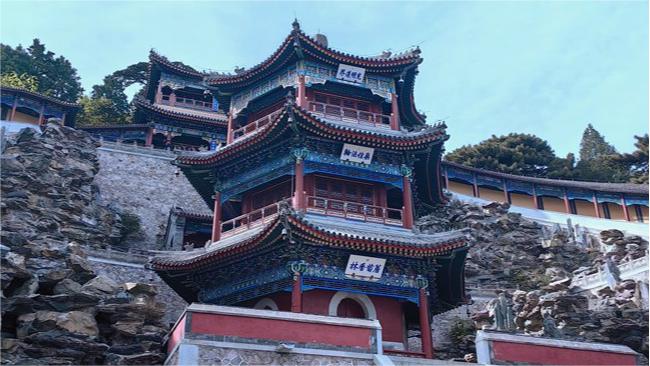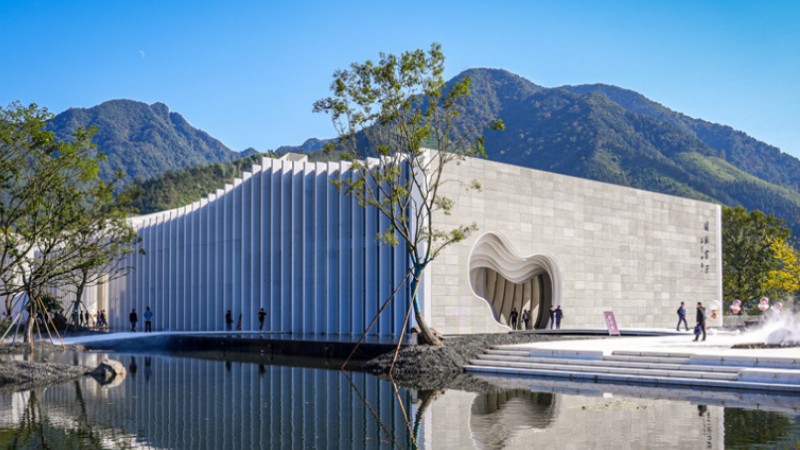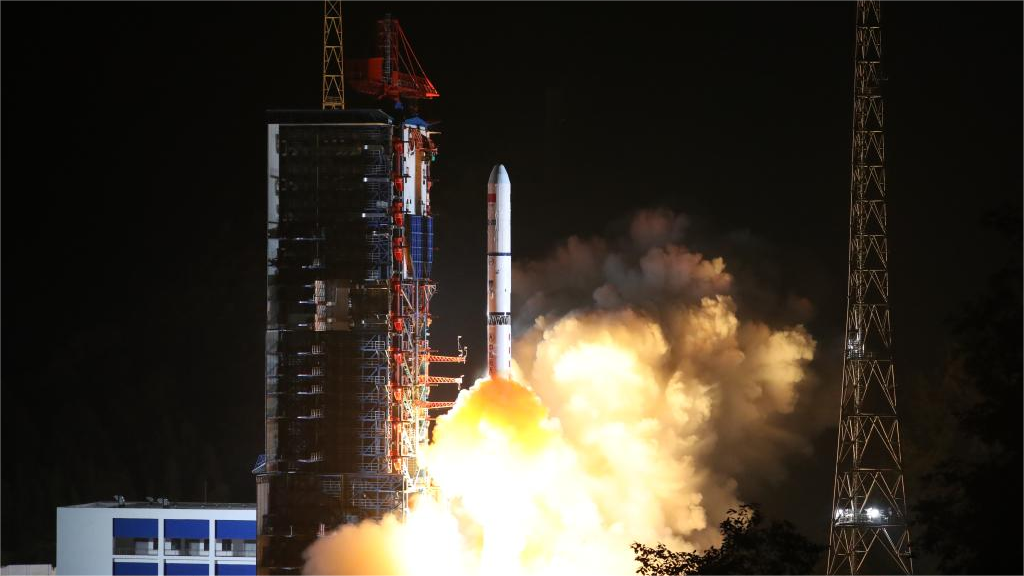Xi Jinping Thought on Culture guides China’s cultural development
Editor's Note:
Chinese President Xi Jinping not only greatly values culture, he has also developed a profound understanding of it.
For the president, culture plays a unique and irreplaceable role in the rejuvenation of the Chinese nation and the building of a global community of shared future.
He speaks for Chinese wisdom, which has been passed down for millennia, advocates for mutual prosperity of global civilizations, welcomes the flourishing of popular cultural products, and encourages young people to inherit and reinvent their proud traditions.
This issue emphasizes Xi Jinping Thought on Culture, and how it holds theoretical and practical significance for further strengthening cultural development, fostering cultural confidence, building a modern Chinese civilization for the Chinese nation and advancing modernization around the globe.
At the recent national meeting on the work of public communication and culture held in Beijing earlier in October, Xi Jinping Thought on Culture was put forward for the first time.
An instruction by President Xi Jinping was conveyed at the meeting. In the instruction, he stressed building stronger cultural confidence, following the approach of openness and inclusiveness, and upholding fundamental principles while breaking new ground to provide a strong ideological guarantee, spiritual strength and favorable cultural conditions for building a modern socialist country in all respects and advancing the great rejuvenation of the Chinese nation on all fronts.
Experts believe culture serves as the soul and vital force for the survival and development of a nation. Without a high degree of cultural confidence and cultural prosperity, there can be no great rejuvenation of the Chinese nation. The promotion and flourishing of socialist culture are essential for the comprehensive development of the socialist modernization and great rejuvenation of the Chinese nation.
Xi Jinping Thought on Culture is a summary of the practice and a crystallization of theory concerning cultural preservation and development in the new era.
On July 1, 2021, during the celebration of the 100th anniversary of the founding of the CPC, Beijing's Tian'anmen Square bore witness to a solemn declaration proposed by Xi: "We must continue to adapt the basic tenets of Marxism to China's specific realities and its fine traditional culture."
The declaration prompted strong resonance in the fields of ideology, theory, and culture, signifying the maturity of theoretical achievements in cultural construction.
Experts have pointed out that the timing of the introduction of Xi Jinping Thought on Culture is significant as China already has a strong "hard power," and it allows the nation to internally unify its historical cultural wealth and enhance its confidence, while also creating China's "soft power" on the international stage. This is reflected in the "requirements in seven aspects" Xi made in the recent national meeting.
Wang Xuebin, a professor at the Party School of the CPC Central Committee (National Academy of Governance), told the Global Times that each of the seven aspects performs its own duties, and is interconnected internally and externally. "Xi Jinping Thought on Culture is a theoretical summary of the practical experience of the CPC's cultural construction leadership in the new era. It enriches and develops Marxist cultural theory and constitutes the cultural chapter of Xi Jinping Thought on Socialism with Chinese Characteristics for a New Era."
"President Xi has set new cultural standards, aimed at enhancing cultural prosperity and positioning China as a global leader in culture. His vision seeks to elevate modern Chinese civilization with a fresh and distinctive perspective," Mahnoor Makhdoom, an editor at China Affairs, The Daily Mail of Pakistan, told the Global Times.
New culture in the new era
For experts, "promoting the creative transformation and development of fine traditional Chinese culture" means to better inherit China's profound traditional culture as a part of the excellent culture of modern China.
Xi has demonstrated a deep commitment to cultural heritage and cultural artifacts, having visited more than 100 historical sites such as the Confucius Temple, Dunhuang Mogao Caves, Sansu Temple, and the Yin Ruins, and made over 170 directives and instructions regarding cultural relics, archaeology, and intangible cultural heritage.
Lei Xingshan, president of Beijing Union University, told the Global Times that China has actively promoted the legalization of cultural heritage protection and the return of lost cultural relics from abroad. This has invigorated the national spirit and strengthened cultural confidence.
In the realm of cultural inheritance and development, Xi has accurately grasped the inherent principles and scientific methods for dealing with China's fine traditional culture. This paves the way for the continuation of Chinese culture and points toward its future development in the new era.
Tang Fei, chief of the Sichuan Provincial Cultural Relics and Archaeology Research Institute, told the Global Times that Xi Jinping Thought on Culture naturally aligns with the nation's development in the field of culture and its international image. It is a guiding light in these efforts.
"Sanxingdui culture, representing the ancient Shu civilization, is one of the outstanding representatives of Chinese culture. It showcases the majority of the five prominent features of Chinese civilization," Tang said, adding that in the construction of civilization in the new era, the institute will strive to tell the story of the ancient Shu culture behind Sanxingdui to the world and strengthen talent development and cultural artifact restoration.
Su Dan, deputy curator of the China National Arts and Crafts Museum, told the Global Times that innovation is the norm for cultural development in the new era.
For example, the China National Arts and Crafts Museum, also known as the China Intangible Cultural Heritage Museum, is primarily responsible for the research and promotion of China's intangible cultural heritage. Over the past two years, the museum has organized more than 20 exhibitions related to intangible cultural heritage and hosted nearly 100 related cultural and educational events, receiving praise from the public.
Confidence leads to strength. A nation with cultural confidence can stand firm and achieve greatness. In the new era, the cultural confidence of young people is essential for carrying on their country's culture.
Taking inspiration from China's traditional yunjin brocade, Chen Liwen, a Chinese designer in her mid-20s, has turned the 700-year-old intangible cultural heritage into a new fashion trend that appears in people's everyday lives through her fashion collections like the "Tiger Sniffs the Rose," which was inspired by the iconic brocade pattern known as "tiger patch."
"It made me feel so confident and almost privileged to be able to grow up surrounded by Chinese culture. That was the moment I became committed to yunjin [brocade]," Chen told the Global Times.
A third-generation inheritor, Langjia Ziyu, 28, is also an "innovator" who seeks to revive Beijing dough figures, a traditional folk art that is listed in China as a protected intangible cultural heritage.
"Young inheritors' power is at they are walking proof of the continuity of traditional Chinese culture. Their creative works have a life force that can challenge stereotypes," culture expert Fang Qiongyi told the Global Times.
Creating a better shared future
Chinese civilization has always been known for its openness and inclusivity, continuously revitalizing itself through interactions with other cultures, which has been concluded into the aspect of "enhancing international communication capacity and promoting exchanges and mutual learning among civilizations."
For instance, the ancient Silk Road has witnessed China's exchanges with the world since the Western Han Dynasty (206BC-AD25).
Ma Lüwei, an archaeologist, told the Global Times that "cultural diversity" is a fundamental keyword to understanding the Chinese civilization.
As a hub of the ancient Silk Road, Northwest China's Xinjiang Uygur Autonomous Region is "living proof" of how diverse ethnic beliefs were embraced by China. In the Xinjiang Museum, a Tang Dynasty (618-907) mooncake, made through the merger of the culinary cultures of both the Western Region and Central Plains, is a good example.
Ma told the Global Times that cultural exchanges are not only among ethnic groups but also extend to other parts of the world such as Central Asian countries like Uzbekistan and European countries like Italy and France. In recent years, China has co-launched many archaeological projects with those countries to extend mutual learning in the contemporary age.
Pakistani editor Makhdoom believes that Xi's cultural vision draws inspiration from his initiatives, such as the Global Civilization Initiative.
It is an undeniable fact that social and cultural development not only contributes to global peace and security, but also fosters socioeconomic growth worldwide.
Therefore, President Xi's cultural vision can be regarded as a roadmap to peace, security, development, and economic prosperity, aimed at transforming China into a modern socialist society capable of ensuring peaceful development and harmonious coexistence, with the ultimate goal of establishing a global community of shared future, Makhdoom said.
"China is undoubtedly recognized as a strong industrial, technological, financial, and defense powerhouse. However, it is now imperative to showcase the nation's cultural and social heritage on the global stage. These segments of society can play a pivotal role in advancing China's soft power by alignment with Xi's vision," Makhdoom said.
Since September, by the banks of the Qiantang River, the Asian Games and Asian Para Games held in Hangzhou allowed the brilliance of technology and the beauty of humanity to shine together. This marked the beginning of a new era of Asian sports glory. The Games with Chinese characteristics, an Asian style, and exciting diversity showcased the diverse aspects of modern China and provided the world with a new window into understanding China.
Today's China has become a nation where dreams are continually realized. Full of vitality and national spirit, it is closely connected to the world. China's unique modernization has created a new form of human civilization and exhibits a new vision of modernization.
Li Xiaoyan is a director of Central Compilation and Translation Press, which has published many books about Xi, including the English edition of the collection of Xi's diplomatic speeches. Li told the Global Times that China's "hard power" is already robust, whether it's in terms of infrastructure development, aerospace technology, overall national economic strength, or technological innovation. In addition, China has been playing an increasingly prominent role in international affairs, actively promoting global governance.
For example, various world leaders have visited China, and under China's mediation, Iran and Saudi Arabia announced the restoration of diplomatic relations. China's foreign policy principles and the concept of a global community of shared future have gained widespread acceptance in the international community, which is a concrete manifestation of the world's recognition of China's ideas and value.
Ronnie Lins, director of the China-Brazil Center for Research and Business, told the Global Times that in the current global scenario, President Xi's ideas on cultural development are precious and exemplify how the leader of a large nation should act for the benefit of humanity.
He highlights the importance of cultural strengthening with a broad approach to openness and inclusion of fundamental principles. These elements are crucial for building a modern socialist country and assist in promoting the significant revitalization of the Chinese nation.
The Global Civilization Initiative proposed by China underscores the need for tolerance, coexistence, exchanges, and mutual learning among different civilizations, which play an irreplaceable role in advancing the modernization of human civilization.
"Among the main proposals, we highlight respect for the diversity of civilizations, defense of shared human values, and increased international exchanges and cooperation," Lins said.
Photos
Related Stories
- Expectations run high of Colombia-China cooperation amid president's maiden trip to China
- Xi holds talks with Colombian president, elevating ties to strategic partnership
- Xi meets U.S. California governor
- Xi stresses mobilizing workers to participate in national rejuvenation
- Xi meets U.S. California governor
- Inspirational tour across China: African youth leader inspired by Xi's early life emphasizes the importance of grassroots work
- Greatness comes from the ordinary
- Xi says China ready to promote win-win cooperation with U.S.
- Xi vows China's continued efforts to build peaceful, prosperous Asian homeland
- Xi stresses Party's leadership over trade unions, mobilizing workers to participate in national rejuvenation
Copyright © 2023 People's Daily Online. All Rights Reserved.









